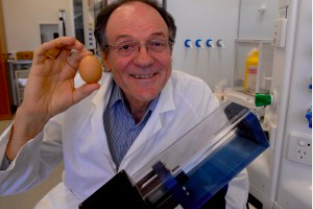
September 18, 2015
 Contributed Art/Flinders University
Contributed Art/Flinders University
Flinders University Professor Colin Raston, the South Australian Premier's Professorial Research Fellow in Clean Technology.
A team of Australian researchers who received an Ig Nobel award Thursday night – think the Nobel Prize for quirky science – are refining a technology that could accomplish far more than the miracle of partially unboiling an egg.
Flinders University Chemistry Professor Colin Raston showcased his Vortex Fluidic Device (VFD) for the world to see in the fascinating egg experiment, unraveling its congealed proteins to reverse it to its original, goopy state.
That may seem more magical than groundbreaking, but the same device could revolutionize pharmaceutical research by facilitating the separation of proteins during the process of drug discovery. Cancer patients, in particular, will benefit from more effectively manufactured drugs that minimize dosage sizes and side effects.
The device has already delivered a fourfold increase in the efficacy of carboplatin, a drug frequently used to treat ovarian and lung cancer, according to MedicalXpress.
Professor Raston's invention will also have applications that serve the biofuels and food industries, reducing production costs and waste while driving innovation that brings significant environmental and social benefits.
“The sheer scale of this is mind boggling," Raston said in a Flinders blog. "The global pharmaceutical industry alone is worth $160 billion annually and the processing of proteins is central to it...Winning an Ig is both humbling and amazing."
The device is currently being manufactured at Flinders University and will increasingly become available to research organizations around the world.
Check out the rest of the 2015 Ig Nobel winners here.